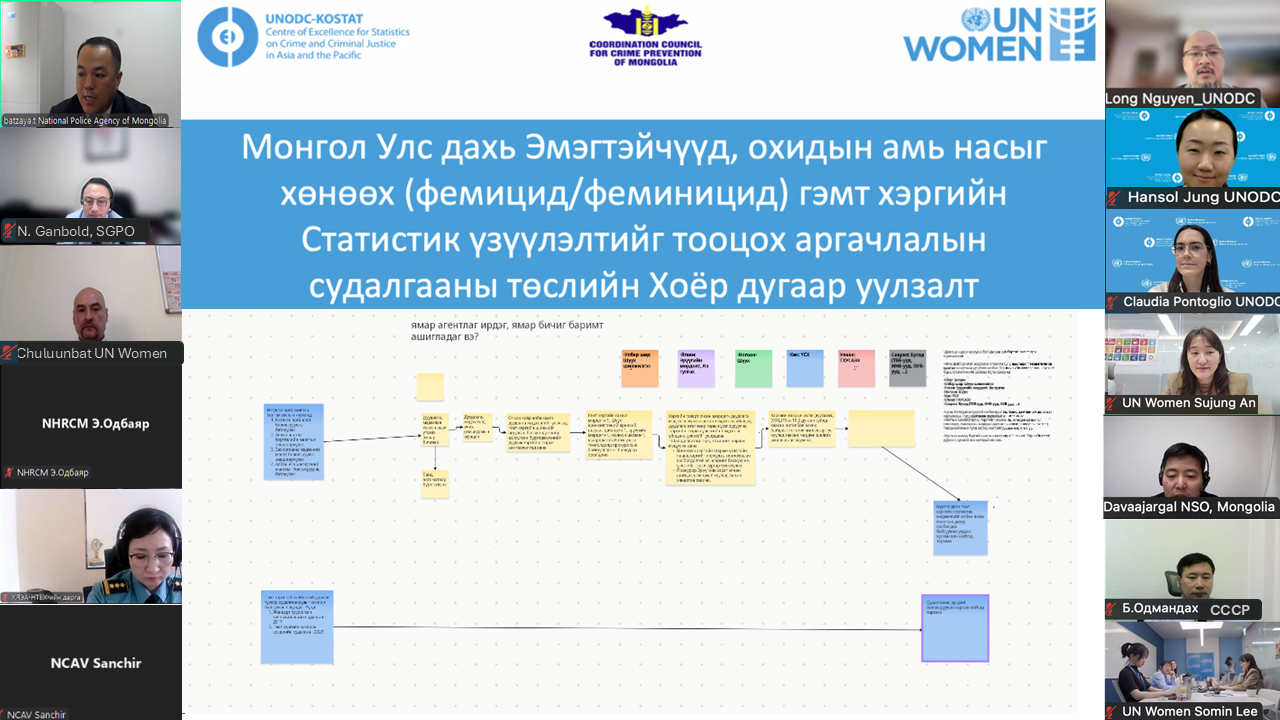
Ulaanbaatar (Mongolia), Virtual, 26 March 2025 - Reliable data is critical to understanding the scope and dynamics of gender-related killings. Accurate data helps identify risk factors, strengthen protective measures, and develop informed policies that prevent such crimes. In a significant step toward addressing gender-based violence, the second meeting to pilot the implementation of the Statistical Framework for Measuring the Gender-related Killing of Women and Girls (also known as femicide/feminicide) was held online on 26 March 2025. The meeting, co-organized by the UNODC-KOSTAT Centre of Excellence for Statistics on Crime and Criminal Justice in Asia and the Pacific (CoE) and UN Women Knowledge and Partnerships Center (UN Women Center) in collaboration with the Coordination Council for Crime Prevention of Mongolia (CCCP), brought together experts and stakeholders to discuss the ongoing implementation of the framework in Mongolia.
The event began with a welcoming speech by Odmandakh Banzragch, Head of the Department of Crime Prevention Coordination at the CCCP, who highlighted the global dimension of violence against women and girls (VAWG) impacting all dimensions of society. The opening speech continued with Duc Long Nguyen, Crime Prevention and Criminal Justice Officer and Head of the UNODC Mongolia office, underscoring that the Femicide Framework extends beyond measuring gender-related killings; it also provides valuable insights into various forms of crime in Mongolia, aiding in a broader understanding of violence and its underlying factors. Finally, Sujung An, Programme Officer at the UN Women Center, delivered remarks on behalf of Vu Phuong Ly, Gender Training Specialist and Officer-in-Charge of the Center. She reiterated the importance of using reliable data to develop targeted interventions to protect vulnerable groups and foster safer communities.
The first session of the meeting began with a presentation on institutional mapping and key findings related to data collection on intentional homicides and femicide in Mongolia. The key stakeholders are the National Police Agency, the National Forensic Agency, the State General Prosecutor’s Office, the Court/General Judicial Council, and the National Statistical Office. The presentation outlined the criminal procedure in each institution along with the statistical byproducts at each stage. Participants reviewed and verified these preliminary findings and were invited to create their own data flow charts, offering deeper insights into institutional processes.
The second session started with an interactive icebreaker exploring the distinctions between sex, gender, gender identity, and sexual orientation – terms integral to the analytical variables in the framework. This was followed by a presentation assessing the extent to which Mongolia currently collects data aligned with the Framework’s core and analytical disaggregating variables. Participants were encouraged to share updates or correct any inaccuracies in their institution’s data collection. The session concluded with a presentation on the potential challenges in implementing the framework in Mongolia, including the absence of legal and statistical definitions of gender-related killing of women and girls and the underreporting of the VAWG due to cultural stigma, fear of retaliation and limited infrastructure or access to the authorities in remote areas.
While the framework primarily focuses on femicide, its application extends beyond gender-based violence. The core and analytical disaggregating variables within the framework offer deeper insights into crime patterns, supporting a broader understanding of other criminal behaviours such as organized crime, human trafficking, and cyber-enabled violence. This approach is crucial in Mongolia, where complex challenges like corruption, illicit drug use, and transnational organized crime intersect with gender-based violence.
The meeting concluded with a call for sustained collaboration among national institutions, law enforcement, and international partners to ensure the successful implementation of the Statistical Framework for Measuring the Gender-related Killing of Women and Girls.
As Mongolia moves forward with the pilot study, there is optimism that this initiative can serve as a model for other countries seeking to strengthen their response to gender-based violence through data-driven policymaking. The CoE remains committed to supporting Mongolia in aligning its data collection with international standards and enhancing collaboration on regional and global efforts to combat crime.
Further information on the CoE can be found here, X @CoE_UNODC and Facebook @UNODC.KOSTAT.CoE.